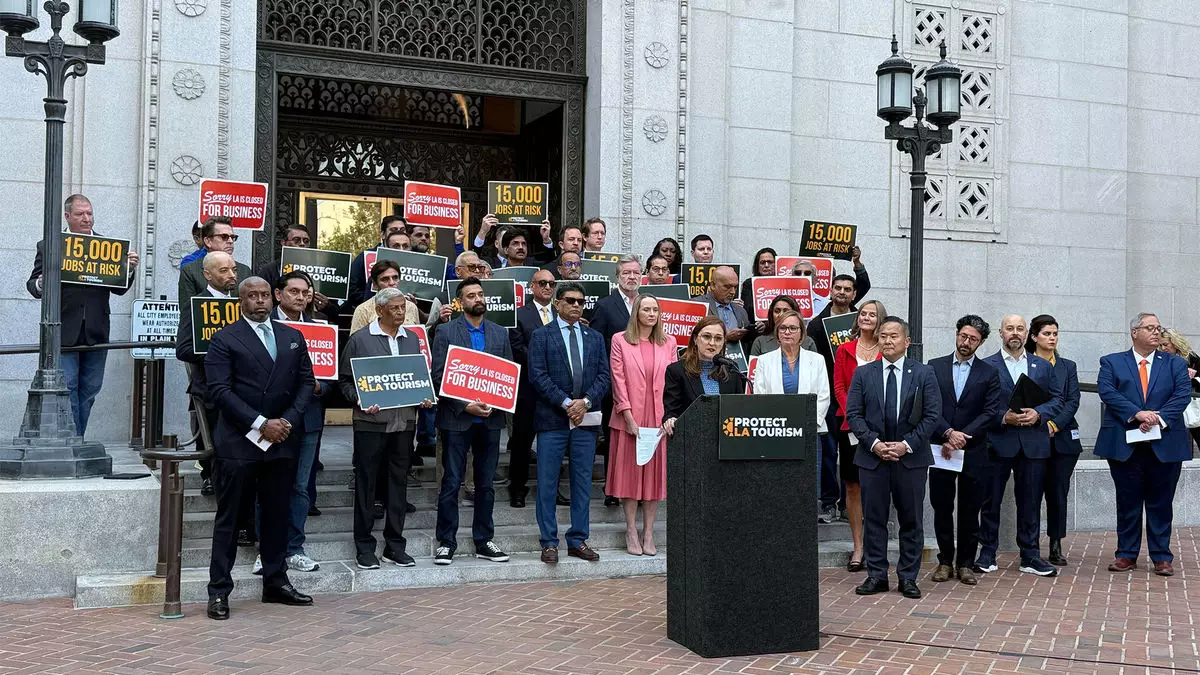In the evolving landscape of the hospitality industry, a critical discussion is unfolding in Los Angeles, where a proposed minimum wage increase for tourism workers to $30 per hour has ignited a fierce debate. Dubbed the “Olympic Wage Ordinance,” this initiative is not just a response to the pressing needs of workers but a significant step toward rectifying the socio-economic disparities in a city that is often characterized by its vast wealth and stark poverty. The tension surrounding this proposal highlights the fine line between economic sustainability for businesses and the urgent need for fair wages for workers who are the backbone of the industry.
The looming presence of the upcoming Los Angeles Olympics adds an urgent dimension to the conversation. Proponents of the wage increase argue this is an opportunity for the city to demonstrate its commitment to its workforce, especially as it prepares for a significant influx of visitors. Conversely, hoteliers are cautioning that such an increase could endanger the fragile recovery of an industry still reeling from the pandemic’s devastation and the recent wildfires. Their warnings, however, must be critically examined in light of the broader impacts on community welfare and economic equality.
Fear and Reality: Job Loss vs. Economic Empowerment
The opposition to the wage increase presents alarming statistics, claiming that the ordinance could lead to a loss of 14,000 jobs and a significant decline in state tax revenue. While it is crucial to consider these warnings, they often overshadow the pressing need for sustainable wages that align with the skyrocketing living costs in Los Angeles. It is vital to recognize that the hospitality industry thrives not merely on profit margins but on the workforce that powers it. When workers earn a living wage, they contribute to the local economy, subsequently enhancing demand for goods and services.
Organizations such as Unite Here Local 11 argue that raising wages is about survival for many families. Supporting workers means investing in a robust community where individuals can afford housing and necessities. This perspective resonates profoundly in an era where affordability and worker well-being are becoming increasingly central to economic discussions, especially in a city grappling with a housing crisis.
Contrasting Views: The Role of Recovery in the Tourism Sector
As various stakeholders converge at city hall to voice their support or opposition, a critical question arises: Can the tourism industry genuinely expect a recovery without sufficiently invested workers? Advocates for the wage increase assert that the potential economic benefits of augmented worker incomes could outweigh concerns about job loss. They argue that a higher wage can lead to increased consumer spending, spurring economic growth, and facilitating a stronger rebound as Los Angeles welcomes significant international events—like the World Cup and Super Bowl—on the horizon.
Yet, observers should not ignore the brutal reality faced by the industry, which has behaved erratically in the wake of the pandemic. Current data shows that Los Angeles is trailing behind other major U.S. cities in tourism recovery rates, which raises valid concerns about the timing of such wage increases. Small businesses and hotels are worried about their ability to compete as tourism demand slowly picks up. Still, is this an appropriate justification for delaying vital reforms that cater to the well-being of everyday workers?
The Bigger Picture: Moving Towards an Equitable Future
The current friction demonstrates that workers are all too often pitted against employers in a zero-sum game where the well-being of one group is constantly sacrificed for another’s economic stability. Such a dynamic not only endangers worker livelihoods but compromises the essence of community. After all, a thriving community rests on the foundation of equity, prosperity, and well-being for all, not just for a select few.
In this critical moment, it is essential for city leaders to engage in comprehensive dialogue that prioritizes both economic recovery and social equity. While the hesitance of hoteliers and the local chamber of commerce may come from a place of concern for operational costs, an outright opposition to minimum wage increases cannot obscure the larger issue of economic disparity affecting the very workers who support the industry.
As Los Angeles moves forward with discussions about the Olympic Wage Ordinance, a new path can emerge—one where collaborative engagement leads to equitable solutions. By embracing the ethics of fair compensation, the city can both herald a new era for its workers and illustrate to the world that Los Angeles stands not just as a host of grand events but as a champion for its everyday heroes: the workers who make it all possible. This could be a historic moment for L.A., where the principle of a living wage finally becomes a reality for those who labor tirelessly to define the city’s vibrant hospitality landscape.


Leave a Reply